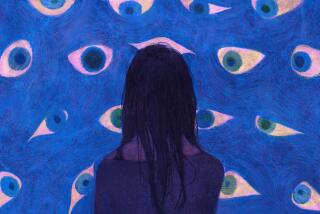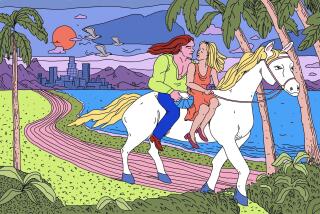Spinoza on the Half-Shell : THE GREAT LETTER E <i> by Sandra Schor (North Point Press: $18.95; 224 pp.; 0-86547-397-8) </i>
- Share via
Poor Barry Glassman. It’s bad enough that he has to contend with a struggling optometry business in a rough Manhattan neighborhood, a wife who is having an affair with his childhood friend and business rival, a pint-size son, and a sister who discards husbands the way others get rid of clothes. In addition to these hardships, the protagonist of “The Great Letter E” must carry within himself the spirit--and, to some extent, the fate--of Baruch Spinoza, the phenomenally brilliant 17th-Century Jewish philosopher.
Barry’s condition corresponds to Spinoza’s in certain surface ways: He shares his Hebrew name; he grinds lenses in order to make a living while remaining devoted to metaphysical concerns; his ideas are despised and maligned by some, treated with respect and acknowledgment by others.
Unlike Spinoza, however, who remained single, Barry looks to philosophical enlightenment as a guide to help him work out the mess of his marriage. He leaves his physically attractive but vestigially phobic wife, thereby suffering the loss of daily contact with his son, of whom he is immensely fond.
His mean little Brooklyn apartment is woefully far from properly brewed coffee and the Bayside garden he had cherished. He longs to rechannel his procreativity into a new sexual relationship, but his romantic forays are neither forceful nor successful.
The problem with Sandra Schor’s often amusing and touching first novel is that Glassman is no Spinoza. He is neither phenomenal nor brilliant, and the author’s attempt to infuse her character with the depth and conflict of the man who was excommunicated by the Amsterdam Jewish community for the provocative radicalism of his views hangs on the pages.
Barry grapples with his belief that everything comes from God; God is the universe and is therefore beyond good and evil. Yet how can he accept this thought when he feels so betrayed by his old buddy Donahue, now raking in the money with a chain of eye-wear stores and sleeping with his wife? On the surface, reading Spinoza helps buttress his conviction that he should not be consumed by loss and loneliness. “A free man thinks of nothing less than of death,” he quotes to himself. It makes sense to him that, “since substance must exist, death subtracts nothing from the universe” and, therefore, that “some powerful law of compensation exists.”
Yet he cannot help but feel for his dead father, lying alone in his grave, abandoned by Barry’s mother, who--in a final burst of free thinking--has had herself cremated. And what is he to make of the fact that, on an ill-fated plane that he nearly took himself, 41 optometrists, including a number of his friends, are killed--thereby expanding his business without his having to lift a finger?
The answer, the author seems to be telling us, lies in the fact that mere humans cannot know the ways of the world except in a fragmentary way. Thus, the cause of the plane crash is never discovered, and this lapse in understanding is metaphysically fitting. The theme of humankind’s limited vision is brought to the fore through the characters of Bernard Messenger, Barry’s blind but perspicacious Brooklyn neighbor, and Enid Moscow, his myopic, elusive and sexually irresistible cousin.
Bernard cannot see the way Barry does with his perfect eyesight, yet he is able to feel his way through life, getting what he needs; and Enid--the heart and soul of the book--bumbles her way along.
Bernard and Enid accept the unravelled mysteries of their lives: why it was Bernard’s fate to be stricken blind through a bout with meningitis at age 8; why it was that Enid’s brother disappeared one day in 1968 while taking a Civil Service exam, never to be heard from again. From them, Barry learns that there is existence beyond puzzling the unfathomable, and the transformation is salutary. By the book’s end, he has discovered that the greatest E of all is not on the eye chart, nor is it Spinoza’s Ethics, nor even Espinosa (Spinoza) himself. Rather, it stands for Enid and the power of love and friendship.
In the end, as many loose ends as the novel itself leaves--proving that the form of a work can illustrate its thematics--and despite some conspicuous symbolism, there is a cheer about the book that lingers.
On Yom Kippur, the Jewish Day of Atonement, he hears a proverb: “If you see a blind man, kick him, lest you be kinder than God.” Suddenly, a bit of religious truth dawns on him: The proverb is wrong. Everyone--Bernard, he himself, his wife, even Enid--is blind in a different and separate way, and the reasons for this are unknown.
Thus, compassion is always in order. After all, why risk being meaner than God?
More to Read
Sign up for our Book Club newsletter
Get the latest news, events and more from the Los Angeles Times Book Club, and help us get L.A. reading and talking.
You may occasionally receive promotional content from the Los Angeles Times.









